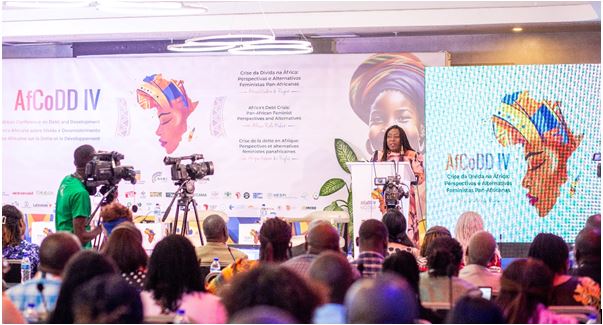By Kizito CUDJOE, Maputo, Mozambique
The Board of Trustees-African Forum and Network on Debt and Development (AFRODAD) Chair, Barbara Kalima-Phiri, has called for a fundamental overhaul of societal, economic and political structures which have long marginalised women across Africa, given their impact on development.
Speaking during the African Conference on Debt and Development (AfCoDD IV) 4th edition’s opening session, she emphasised that Africa’s journey toward becoming a ‘Rule Maker’ on the global stage hinges on recognition and empowerment of women as key agents for political and economic emancipation.
Her address highlighted the systemic challenges which have historically undermined the contributions of African women, arguing that any meaningful economic transformation on the continent must address these deep-rooted issues.
She said: “Africa’s economic transformation and its quest to be a Rule Maker rather than a Rule Taker require an overhaul of the societal, economic and political structures that undermine women and their contributions to the continent”.
AfCoDD IV is being held under the theme ‘Africa’s Debt Crisis: Pan-African Feminist Perspectives and Alternatives’, and is focused on the intersection of Africa’s rising debt burden and gender inequities that persist across the continent.
Kalima-Phiri pointed out that despite numerous African Union protocols aimed at promoting women’s rights and participation in economic activities, the continent’s progress toward gender equity remains disappointingly slow.
“The low participation of women in political life and leadership positions is a direct consequence of these protocols slow implementation,” Kalima-Phiri noted – citing the Maputo Protocol and Malabo Declaration as examples of well-articulated yet inadequately executed frameworks.
According to the AFRODAD Board of Trustees Chair, the current global debt and financial architecture exacerbates these inequities – disproportionately affecting African women.
She argued further that a feminist lens is essential in re-evaluating macroeconomic policies which often prioritise profit over people, leaving women in precarious economic situations.
She cited that Africa’s external debt as a percentage of Gross Domestic Product (GDP) has risen sharply from 19 percent in 2010 to nearly 29 percent in 2022. Over the same period, the composition of creditors has shifted – with private creditors now accounting for 44 percent of the debt, up from 30 percent in 2010.
This shift toward privatisation and financialisation of development, Kalima-Phiri contended, has only deepened the economic vulnerabilities of women… who make up a significant portion of the continent’s smallholder farmers.
Also, speaking in a programme in Maputo-Mozambique, Executive Director-AFRODAD Jason Rosario noted that the growing burden of public debt on the continent is not only stifling economic development but also sparking widespread social unrest.
He stressed the urgent need for a comprehensive reevaluation of how African countries manage their debt; while highlighting the alarming trend wherein over 27 African countries are now allocating more of their budgets to debt-servicing rather than essential public services such as health and education.
“When countries are forced to channel a significant portion of their resources to repay creditors, it means less investment in public services that are crucial for the well-being of our citizens,” he explained.
The economist also expressed concern over increasing public dissatisfaction across the continent, pointing to recent protests as evidence of growing unrest. “The burden of debt servicing is becoming unsustainable, leading to widespread unhappiness among citizens who see their governments prioritising debt repayments over investments in critical areas like health and education,” Rosario noted.
Rosario emphasised the relevance of hosting the event in Maputo, a city closely associated with the Maputo Protocol – a landmark agreement among African Union member states aimed at boosting investments in gender-related initiatives.
“We’re here to assess progress made under the Maputo Protocol in advancing the status of women on our continent,” Rosario said. “Women make up more than 50 percent of Africa’s population and are key contributors to its economic success and transformation. Understanding how public debt impacts their lives is crucial for our broader discussions on economic policy and reform.”
AfCoDD IV, a three-day conference, is organised by AFRODAD together with the Nawi Afrifem Macroeconomic Collective (Nawi), Centre for Democracy and Human Rights (CDD) and Stop the Bleeding Campaign (STBC).










